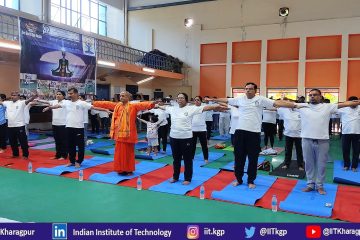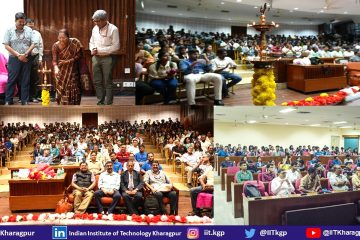An inspiring leader, dedicated nationalist and a visionary, Maulana Abul Kalam Azad was the first Union minister for education of independent India. Since 2008, the nation has been celebrating the birthday of Maulana Azad as the National Education Day on November 11. This year too, educational Institutions all over the country commemorated the occasion by organizing seminars, symposia, essay writing and elocution competitions, and rallies with banners and slogans that emphasized the importance of education and the nation’s commitment to all aspects of education.
At IIT Kharagpur, the National Education Day began with a floral tribute to Maulana Azad at the Institute Main Building. This was followed by a workshop organized and coordinated by Prof. Manoj Kumar Tiwari, Dean, Planning and Coordination, on the topic, “Curriculum: Looking ahead”, at the Bhatnagar Auditorium. The workshop was attended by Prof. Sriman Kumar Bhattacharyya, Deputy Director of the Institute, Prof. P.K. Das, Dean (PGS&R), Prof. B.N. Singh, Dean (HR) & Registrar, Prof. Subhasish Tripathy, Dean (Faculty), staff members along with students. There were more than 350 participants at the workshop.
 The speakers at the workshop extolled the role Maulana Azad played as the country’s first education minister. Chairman of the Central Advisory Board of Education, he had laid the much needed emphasis on adult education and literacy for a newly independent India where illiteracy was a scourge. He had pointed out that “We must not for a moment forget, it is a birthright of every individual to receive at least the basic education without which he cannot fully discharge his duties as a citizen.” His insistence that children should have free and compulsory education till the age of 14 is a constitutionally guaranteed fundamental right.
The speakers at the workshop extolled the role Maulana Azad played as the country’s first education minister. Chairman of the Central Advisory Board of Education, he had laid the much needed emphasis on adult education and literacy for a newly independent India where illiteracy was a scourge. He had pointed out that “We must not for a moment forget, it is a birthright of every individual to receive at least the basic education without which he cannot fully discharge his duties as a citizen.” His insistence that children should have free and compulsory education till the age of 14 is a constitutionally guaranteed fundamental right.
The second important facet pointed out by the speakers at the workshop was the fact that Maulana Azad, despite having no formal schooling, was a self-taught philosopher, poet and editor who went on to lay down the foundation of the higher education policy of India. Not merely that, he pushed for both secondary education and vocational training. He realized that in order to improve the higher education scenario in India, weight had to be lent to the development of secondary education as well. As education minister, he allocated budget accordingly and saw to it that this development took shape.
 The speakers not only appreciated Maulana Azad’s role as a national leader, but also his patriotic zeal. The assembled audience was reminded of the fact that he had founded the All India Council for Technical Education in 1945. He was instrumental in the founding of the first IIT at Kharagpur and the University Grants Commission, and led the development of the Indian Institute of Science and the Faculty of Technology at Delhi University. It was also under his leadership that the Central Institute of Education was set up in Delhi.
The speakers not only appreciated Maulana Azad’s role as a national leader, but also his patriotic zeal. The assembled audience was reminded of the fact that he had founded the All India Council for Technical Education in 1945. He was instrumental in the founding of the first IIT at Kharagpur and the University Grants Commission, and led the development of the Indian Institute of Science and the Faculty of Technology at Delhi University. It was also under his leadership that the Central Institute of Education was set up in Delhi.
At the workshop on “Curriculum: Looking ahead”, the speakers talked of how the curriculum should be shaped to cater to the current needs of students, society, industry and how IIT Kharagpur – through various schemes such as microspecialization, minors, semester away programs, international collaboration with foreign universities and so on – is seeing to it that its students can further their careers. Skill development through internship with industry to match the needs of the society and industry was also talked about.
Students present at the workshop raised several questions. One sought to know the speakers’ opinion on coding and its relevance. They were told that coding has become an essential skill for all domains. They also had questions about how the curriculum should be mapped so that students have maximum advantage. They were told that they would be required to take up minors and specializations offered by the Institute in such a way that they acquire a multi-disciplinary skill set.
 Asked why he thought it is important to observe a National Education Day, Prof. Tiwari answered, “It is necessary because we all know that education can transform a society like India’s. It has the potential to make or break an individual. It can transform personality and help as a catalyst to bring changes that are beneficial to society. Education is also necessary so that the youth can make informed choices to build their career. And a National Education Day is necessary to remind people of this potential. Decision-making can be improved with better education and information. Maulana Azad, who was instrumental in the setting up of the IITs, is a perfect example of all that education can achieve.”
Asked why he thought it is important to observe a National Education Day, Prof. Tiwari answered, “It is necessary because we all know that education can transform a society like India’s. It has the potential to make or break an individual. It can transform personality and help as a catalyst to bring changes that are beneficial to society. Education is also necessary so that the youth can make informed choices to build their career. And a National Education Day is necessary to remind people of this potential. Decision-making can be improved with better education and information. Maulana Azad, who was instrumental in the setting up of the IITs, is a perfect example of all that education can achieve.”




